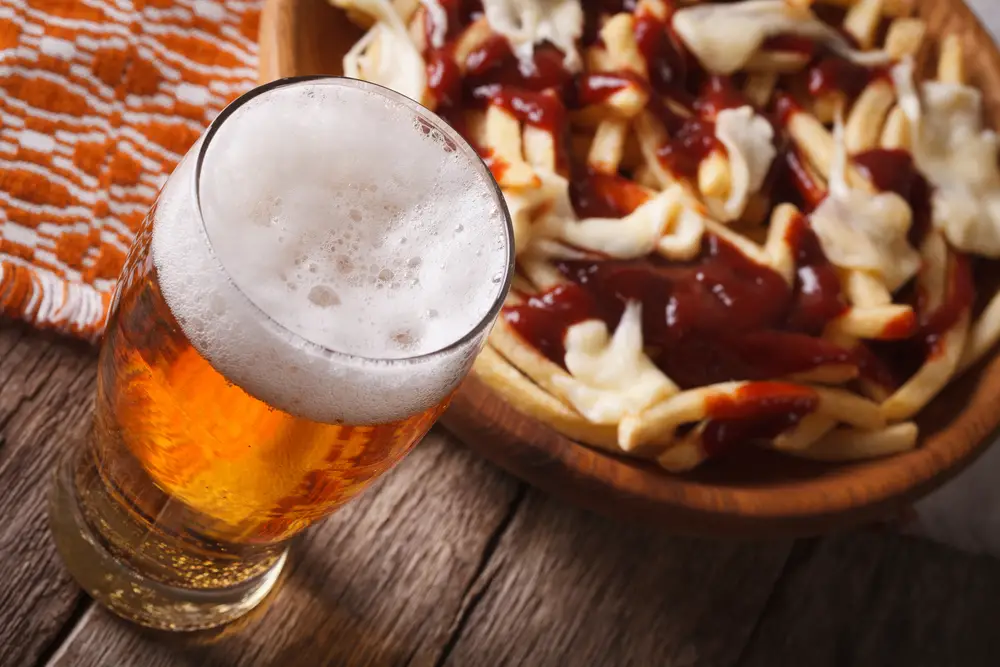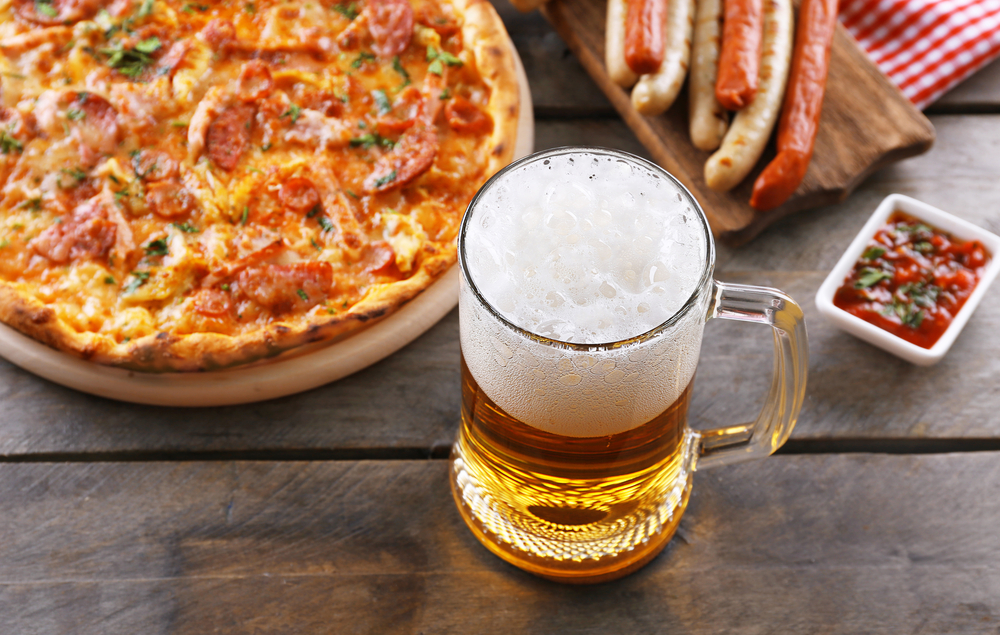Indulging in a cold glass of beer at the end of a busy week is an irresistible reward for many. The old question remains though: should you drink beer before or after eating? What are the pros and cons? Let’s dive right in.
Table of Contents
ToggleIs It Okay To Drink Beer Before A Meal?
Alcohol absorption is faster on an empty stomach–alcohol passes quickly from your bloodstream to your small intestine when there’s no food to slow it down. As a result, your body absorbs most of the alcohol in a short amount of time. If you don’t mind getting drunk right away and you don’t need to drive or do something important, there’s nothing wrong with drinking before a meal (as long as you don’t do it too often).
Drinking on an empty stomach should not be done regularly since it may lead to health issues and more unpleasant side effects related to a hangover. A bad headache, nausea, liver problems, inflammation, heart disease, and stroke are only some of the disadvantages you may experience if you don’t take control of your drinking habits.
It goes without saying, but having a beer on an empty stomach every once in a while is also okay if you don’t have any health conditions like digestive problems that can get worse with alcohol. Still, it might be best to seek professional advice or simply avoid alcohol to be sure.
Is It Good To Drink Beer After Dinner?
Some people don’t like drinking after having supper because they don’t get as drunk as they want to be or they feel nauseous. Alcoholic beverages trigger increased stomach acid production, so a full tummy can make you vomit after you’ve had a few. On the other hand, drinking after a meal lowers your chance of damaging your liver because you absorb the alcohol way slower.
Depending on your body, having a beer after dinner may boost your energy or help prepare you for sleep. As booze has the ability to give you that warm, fuzzy feeling, you’ll be ready to make the most of your night if it rouses you. You won’t have to worry about dozing off at a party or a pub on a Friday night. However, you can count on your brew to bring you straight to dreamland if it makes you drowsy.
How Long Should I Wait To Drink Beer After Eating?
It’s recommended to wait at least an hour after a meal before getting yourself another glass. You might feel like your tummy is empty after 45 minutes, but it’s better to take your time. Others even opt for a 3 to 4-hour break just to make sure.
It’s not ideal for drinking right after eating since alcohol interferes with the digestive process. What’s more, those with high alcohol content can cause inflammation and delay digestion, leading to discomfort. Gut irritation occurs as toxins get trapped inside your stomach.
If you’ve just started eating, you can take a sip of your beer after 15 minutes. Let the food settle. All in all, there is no one-size-fits-all when it comes to drinking beer. You need to consider factors like body mass index, metabolism, gender, and physical fitness in order to know if you’re better off drinking before or after meals.
The Best Time To Drink Beer
If you drink in moderation and your alcohol tolerance is not extremely low, you can have a beer any time you want. Responsible drinking, along with knowing your health status, will help you decide when it’s best to grab a beer. Don’t drink on an empty stomach if you have a sensitive tummy (especially if you’re acidic), and don’t drink after a big meal if you easily get nauseous. Other than that, it all boils down to personal preference.
Many beer lovers claim that beer tastes better with food, which is true. Unless you absolutely love beer, you won’t enjoy its bitter flavor without the right food to balance it out. The greasiness or saltiness of a carb-packed meal, for instance, can perfectly complement your booze. Try munching on a bacon cheeseburger while having a drink, and you’ll get a pleasant surprise. Sweet and savory go well with bitter and tangy flavors.
Do You Gain More Weight By Drinking After Eating?

Drinking before a meal can stimulate your appetite and make you more hungry, creating the urge to overeat. You feel like you can consume more food than usual and might not feel full until you’ve had a lot. This can lead to weight gain, even more so if you do it frequently.
In the same way, drinking after eating might also make you add on a few pounds. If you don’t have a well-balanced meal, you may still crave greasy, salty, or sweet snacks. Meat, chocolates, chips, and anything else that goes well with your beer will turn into extra fat the next day.
Be mindful of your drinking habits if you want to prioritize your diet or fitness goals. Just one glass every week can keep you from achieving a slim waist if you’re not careful. If you’re the type to gain weight fast, you can’t just give in to your favorite drink every weekend. It might help to watch your portions or drink when you’re neither too full nor hungry.
Conclusion
Drinking before or after meals comes with pros and cons. Having a beer before you eat is okay every once in a while, given that you’re healthy and not prone to any kind of disease. Drinking on an empty stomach too often will increase your chance of developing a serious health problem.
On the flip side, drinking after a meal is much safer because you don’t absorb alcohol right away, plus, it doesn’t disrupt your digestive process. The food you’ve consumed will slow down alcohol absorption and prevent inflammation and complications (like liver damage).
Depending on factors like your body, metabolism, gender, and physical fitness, drinking beer before or after eating may affect you a lot or not at all.

I am a passionate beer connoisseur with a deep appreciation for the art and science of brewing. With years of experience tasting and evaluating various beers, I love to share my opinions and insights with others and I am always eager to engage in lively discussions about my favorite beverage.
















